Overthinking It is celebrating our nation by searching for the most American piece of pop culture with the word “American” in the title. Read the entire series
 owdy! We’re just three matches away from crowning the champ of ‘Merica Madness, and the battles left look to be real slobberknockers! This here is Ryan and Pete, fresh from the Capitalism and Family brackets (respectively) and we’re ready to decide what might be the most awkward, painful match of the tournament: the Sex vs. Violence showdown.
owdy! We’re just three matches away from crowning the champ of ‘Merica Madness, and the battles left look to be real slobberknockers! This here is Ryan and Pete, fresh from the Capitalism and Family brackets (respectively) and we’re ready to decide what might be the most awkward, painful match of the tournament: the Sex vs. Violence showdown.
Like any good American waist deep in sex and violence, you may be asking yourself, “How did I get here?” For a look at the bracket to date, click to enlarge:
These sex and violence matchups were truly brutal, thick with weird bruises and pulled muscles, because the unlikely pair left standing are so sad to see together. How did we get here indeed? Stepping into the ring we have two late-90s tributes to some of our most profound and humiliating personal and collective failures: American Pie vs. American History X.
They won on their own turf, but can they win on ours? To decide this match, Ryan will be giving them a long look through the lens of American Capitalism, and Pete’ll be asking what they have to say about American Family. Then, if the two of us are at odds, we’ll break the glass and bring in our the super secret tiebreaker. Let’s hope it doesn’t come to that.
First, from both of us, here’s one unifying note on the common shortcomings of Pie and X, which make the matchup a little bit poignant, and especially tough to judge.
Young America: Not as Smart as You Think You Are
Even when we hate calling movies flawed, we’re sure as Hell not going to call these perfect. Chunks of these movies feel self-consciously inauthentic, and it’s at least in part because they are both editorializing on young people from the perspective of older people. They’re not just telling the story, they’re judging as they tell.
And the judgment is not just in the story or the characterization; they both employ heavy-handed presentational technique to remind the adults, with an adult voice, that the American teenager is its own beast, different from us, dumber than us, and more passionate, needing our guidance and wisdom as older people.
As now mid-30s Americans who were teenagers when these movies came out, our reactions to these movies have shifted on rewatch: American Pie got better, while American History X got worse.
In Pie, the actors play younger than they are, with affected, manufactured naiveté and self-consciously narrow perspective. They’re just barely a step up from being callous, jerky children. Only the sex-wise Jessica (Natasha Lyonne, who would later join Pie alumnus Jason Biggs on Orange Is the New Black) plays to the top of her intelligence.
While in X, both everyday little things like going to the beach and nasty minor things done and said by nasty people we’d all hope to avoid usher forth with this monumental, commemorative cinematic gusto, this ballistic, massive orchestral treatment, just this titanic filmic gravity. It’s all as if to say “You might not think it’s important, but IT’S ALL THIS KID KNOWS. IT IS HIS AMERICA! IT IS HIS HISTORY! IT IS HIS … … X?”
American Pie’s recalibration feels more honest in our 30s. Now, we can recognize we were totally stupid at that age, in terms of our priorities and our decisions. Whereas with X, from this standpoint, the kid, and us, seem demeaned by the theatricality. That’s a little American brain jerky to chew on as we head into the judging.
Round 1: Check Your Pie Privilege
While much of what is going in both American History X and American Pie is about kids being stupid, it is hard to resist the temptation to revisit both films through some of the lenses that we deployed throughout our investigation of the Capitalism bracket. In particular, a big part of what distinguishes the two films from each other is the class of the film’s main characters. Although they were released one year apart from each other (1998 and 1999, respectively), the economic worlds depicted in each film could not be further apart.

American Pie occupies the upside of the economic boom, set in a upper-middle class Michigan suburb. For the four main characters, going to college is a foregone conclusion, which frees them up to devote every waking moment to losing their virginity. It would have been a lot harder for Chris Klein to be on both the lacrosse team and glee club if he had to work an after school job. For Jason Biggs to be able to accidentally broadcast his webcam misadventures with Shannon Elizabeth, his family would have had to have been an early adopter of broadband internet— there is no way my family’s dial-up connection to AOL could have transmitted any kind of video shenanigans, humiliating or otherwise.

In contrast, American History X takes place in an area left behind by the economic growth of the 90s, an economically depressed poor and working class stretch of Los Angeles— specifically, a pre-gentrification Venice Beach. In many parts of the movie, the rise of Derek Vineyard’s skinhead gang is directly linked to encroaching poverty. In his iconic speech before looting the Korean Grocery store, Derek fires up his troops by reminding them that the changing demographics of the neighborhood have deprived many of the white teenagers and 20-somethings of jobs.
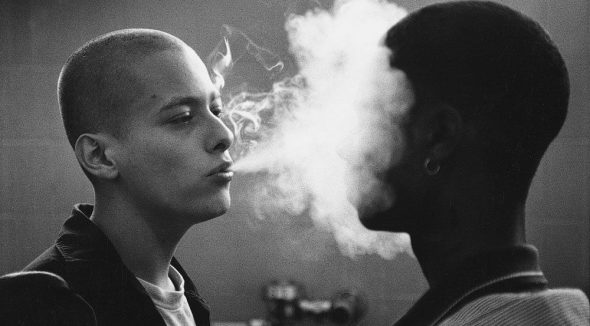
The contrast with American Pie is even more stark when looking at Derek’s younger brother Daniel, who is still in high school during the film itself. In American History X, graduating high school is far from a guarantee, with teachers ready to give up on the kids and the threat of violence lingering in every interaction between students. While American Pie‘s high school bathrooms were filled with embarrassing episodes of diarrhea, American History X’s boys room starts with a brutal beating and ends with a shooting. While the American Pie kids get to be stupid for a while, and then grow up to be more or less just like their parents, the American History X kid didn’t have that luxury.
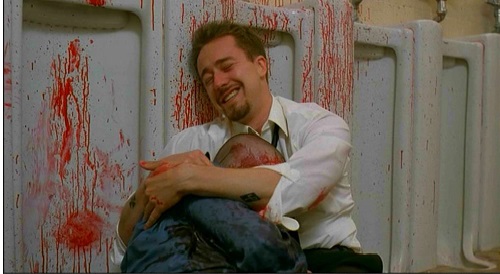
What is particularly striking about watching American Pie and American History X today is that Pie’s suburban sex paradise has been increasingly encroached upon by the violence and precarity depicted in X. Increasing inequality has made the distinction between upper and lower middle class less salient than the vast gulf between the ultrarich and everyone else. The Great Recession of 2008 underlined the increased vulnerability of the middle class, rocking the financial security of many families that would have been as economically comfortable as the American Pie families were in 1999. These economic shifts are at least part of the reason that the kind of rhetoric spouted by Ed Norton’s character has occupied a prominent place in this year’s election. In 1999, American History X was one teenager’s story; in 2016 it is a parable for a country that wishes things were just as easy as pie.
–Ryan Sheely
Score: American History X: 1 American Pie: 0
Round 2: Pie and Punishment
So, with Ryan’s vote cast, it’s up to me to decide whether American History X, as intensely miserable a vision of America as you’ll find in mass entertainment, goes to the finals, or whether it will deadlock with American Pie, a movie I don’t even think of as the standard-bearer for late-90s teen romp comedies, let alone the standard-bearer for the entire country.
I’ve agonized over this choice. I sat in a parking lot in near tears over it, wishing that Can’t Hardly Wait could have had the foresight to call itself American Graduation.
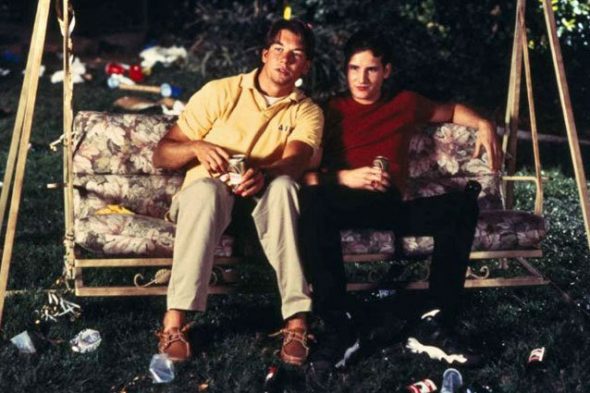
It’s called pathos. You’ll learn about it at college.
Why? Because Pie and X are movies about young men leaving home for the first time that were made around the time I left home for the first time. These people are my contemporaries. And the two visions here for what is happening to the American family at this moment of transformation shake the earth with their difference, and all because of one man:
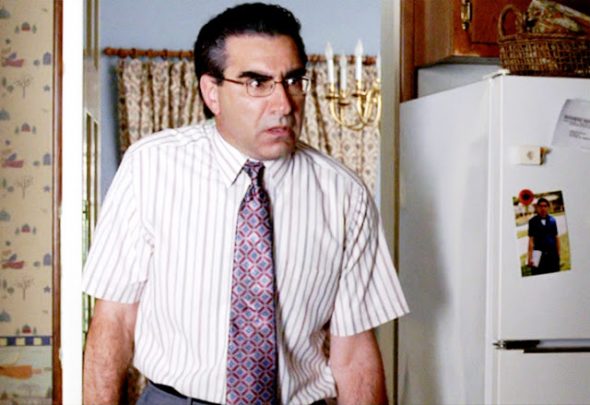
Most underrated parent in movies.
Eugene Levy’s role in American Pie, the father figure willing to humble himself in compassionate understanding of the challenges of the young, committed to helping and caring, would solve most of the problems in American History X. If instead of lecturing him about racist agendas and then dying, Derek Vinyard’s father had merely stayed alive and attempted to teach him about pornography, a whole lot of pain would have been avoided.
Not by the pornography, of course, but by the generosity – the reaching across the barrier between parent and child – the caretaking, the understanding, despite the shame and ridiculousness of it all.
But Eugene Levy is not in American History X. And that’s the point, isn’t it?
That’s what had me sitting in that parking lot. That somehow, watching these two movies next to each other, Eugene Levy’s absence in American History X seems a greater, more palpable truth of that film than his presence does in American Pie.
We even get his rejection by proxy, as Elliot Gould’s well-meaning Murray is driven out of the Vinyard family by Derek’s already violent and dangerous rage and prejudice.
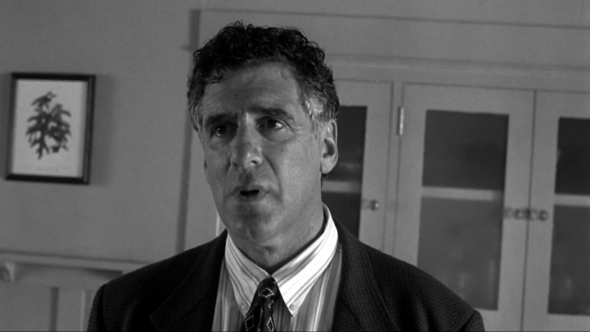
Choosing between these two movies feels like choosing a family reality for America to acknowledge, and it’s a difficult, morose choice that involves accepting or rejecting loss.
Bracket Busters
If either of these movies had been in the family bracket, they would have gone far (though honestly they both would have lost to Kitt Kitterege), as they manage to pass most of the tests I subjected the other contenders to.
Both have phenomenal visions on the purpose and trajectory of the American father (more on that later).
X gets one up on Pie by also including Beverly D’Angelo’s epic depiction of a mother in pain (Doris sleeping on the couch so her children can have the bedroom broke my heart). She wants so much more for her children, of course, than she can give, and she is too paralyzed by loss and terror to understand why.
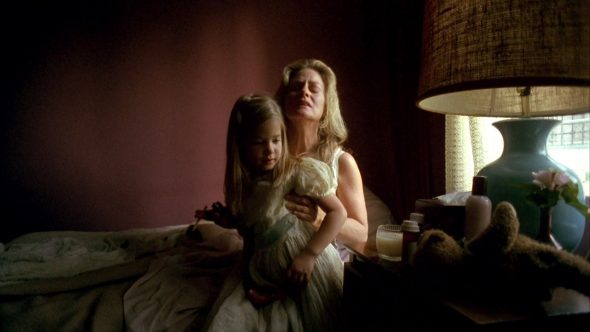
In Pie, the mother is, well, the inspiration of the Oedipal pastry, the one known yonic ideal, that must give way to relationships with gasp actual women as the sons mature and individuate. Mothers in American Pie don’t have agency, and they don’t care for children (Stifler’s Mom notwithstanding). They are sexual and relationship models who exist noumenally and on the peripheries. No woman is invited to the primal scene, which transpires between a man, his son, and an inanimate object. So, Pie falls far short in the American Mother department.
But, Pie is the slightly better American Sister movie, with the women on the cusp of transformations personal, sexual, academic, and emotional. And yet X comes back by showing a transformational sister (Star Trek Voyager’s Jennifer Lien) verbally abused, beaten, mired in hatred and surrounded by actual organized terror, still managing to “rise” in a white girl’s appropriation of Maya Angelou. So it’s close.
And then both are stellar American Brother movies, about young men unmoored, left to their own choices, not held accountable to much.
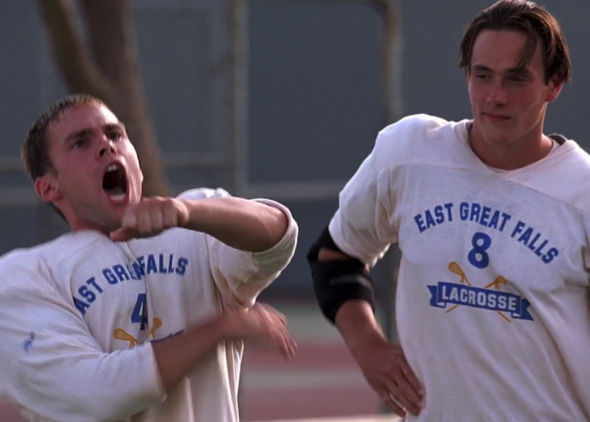
As for its depiction of outsiders, Pie is weak, with Allison Hannigan’s Michelle turning out to be more in the in-group than Jason Biggs’s Jim anticipated (this is a positive for the movie, but a negative for it’s American-ness). X is much stronger, with its relentless exclusionary and hateful rhetoric not just from the white supremacists, but the Black gangs as well, and then Guy Torry’s joyful turn as Lamont the prison laundry man, and the legendary Avery “Captain Sisko” Brooks as one of several proposed and ultimately insufficient surrogate fathers.
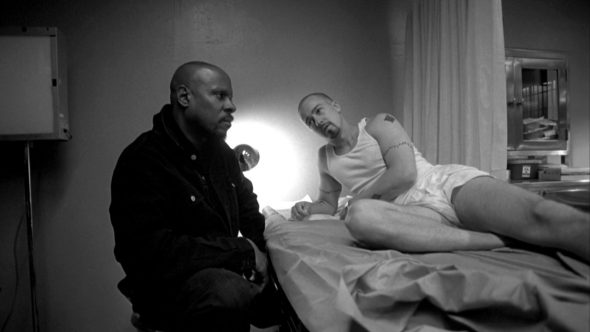
I wasn’t going to find any solace in a holiday chat with my family either. Like the kid I once was occasionally clacking away at the scrambly cable box or trying not to catch beatdowns in bathrooms, I knew I was on my own.
I’ve Got a Blank Space, Baby
It comes back to not what these movies have, but what they are missing, and how they try to bridge that gap.
American History X is, of course, missing the father figure, and introduces an all-too-familiar fact of American Families that has so far gone mostly unexplored in this challenge: the heinous and terrible American adults who manipulate vulnerable children and adolescents into private exploitation.
They find a vulnerable point, track, connect, and then snare the youth into surrogate families-as-a-means – the molesters, rapists, cult leaders, pimps, con men, drug dealers, gang leaders, and, yes, hate group organizers who damn well get what they need by giving little addictive tastes of caring, love, acceptance and purpose to the country’s most vulnerable: its lost children. And then raining down on them pain, fraud, abuse, violation and ultimate ruin – or worse yet, leave them twisted and self-destructive, to rain it upon themselves.
Stacey Keach as West Coast white supremacist #1 Cameron Alexander plays one of these devils with an apt cruelty and ease, from his suitably dad-esque American Flag glass, to his unbearably creepy presence at teenagers’ parties and basketball games, which demands a notice and condemnation from some other adult that never comes.
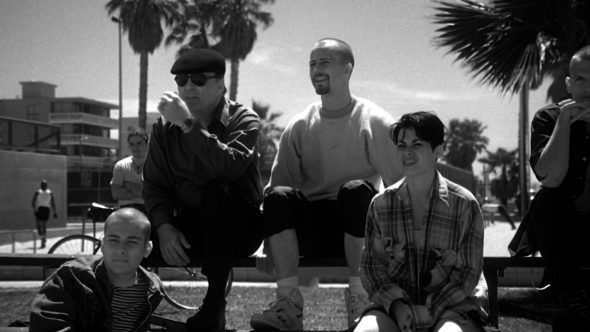
American History X was originally to be a very different movie, a more conventional gang piece about Cameron Alexander’s plans and escapades in the drug trade, but in the final cut that made it to theaters, most of that is stripped away. What’s left is a putrid demon presence who seems to do next to nothing, but whom you know is responsible for so very, very much.
Contemporary sensationalism and the Nancy Grace rotisserie of loss has somewhat trivialized the predator on children, but here he is, teeth bared in a smile, destroying lives.
And it’s him against a high school principal, and time, and karma, and systemic poverty, and the sins of the past.
While this sort of thing happens everywhere, the mobility of the American workforce, the relatively few members of extended family who live together, the strength of so many kinds of institutions, and the potential physical and economic autonomy of young adults make this feel very American, even with the swastikas.
Whereas in American Pie, what’s missing is “the kids away at college” – namely, a basis for comparison and understanding of the leap into sexual maturity, the reconciliation with sexual and intimacy needs, and mature regard for other people as partners. The peculiar prudishness of American culture with regards to sex, in all its violence – here exaggerated, but still well-known – combined with the aforementioned economic and social realities, leave a gap in family structure.
Maturing adolescents are looking for what they don’t have, and they can’t, for the most part, get it from their parents. Even though the parents of American Pie have profoundly good intentions (Stifler’s Mom notwithstanding), the gap in age and the specific social roles present not so much a trail to walk with a guide, but a blind leap to make like a fool in the dark.
Everything is Fine, Nothing is Broken
When I think of American History X in the context of American Pie, I think about how both Derek and Danny have the kinds of developing sexual relationships that the guys in Pie aspire to – Derek has a girlfriend who’s crazy about him and we first meet him in the middle of vigorous sex, and Danny hits it off with a lonely girl at the skinhead party. But within complex notions of responsibility, privilege, loss and fault, the proverbial pie gets cut up and they end up without their piece.
Maybe in another life, Danny would have liked Jazz Choir. But maybe in another life the Shermanator would have become a white supremacist.

And in thinking of American Pie in the context of American History X, I’m reminded of Wilfred Owen’s posthumously published poem “Dulce et Decorum Est,” about a bunch of British young men fighting in World War I who die in a gas attack.
Gas! GAS! Quick, boys!—An ecstasy of fumbling
Fitting the clumsy helmets just in time,
But someone still was yelling out and stumbling
And flound’ring like a man in fire or lime.—
Dim through the misty panes and thick green light,
As under a green sea, I saw him drowning.
The “ecstasy of fumbling” recalls the kind of complicated disrobing unique to sexually active young people who don’t quite know how clothes work or sex works or both.
But of course in American Pie the things that these British young men never get to do, everybody gets to do!
And that, I think, is ultimately what decides it. Despite the second family of the high school social scene, despite the role of pair bonding in perpetuating the family model, despite Casey Affleck’s turn as big brother to the Rookie of the Year, despite Stifler’s bratty little brother in camos, and despite even Eugene Levy’s best efforts, and Stifler’s Mom notwithstanding…
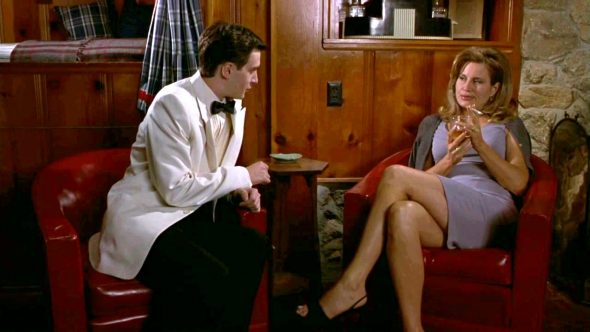
Is it too late to write-in vote for Kit Kitterege?
…American Pie presents a vision of the American Family where nothing serious is wrong. American History X offers comparable depth and interest, similar themes at times, even vaguely similar events at a similar time to people of similar ages, and even in its darkness it is less unrelentingly negative than American Pie is unrelentingly positive.
Ultimately I don’t think I can endorse a movie where everything is always fine as the superior expression of the American Family in pop culture. Just as I shot down certain other entrants for their negativity making them Un-American, so I must profess that I don’t think the future for bonding, connection, family and intimacy in our country and its culture is still made in the image of getting laid at prom and leaving with our sweethearts for Michigan and State, if it ever was.
–Pete Fenzel
Score: American History X: 2 American Pie: 0
Winner: American History X
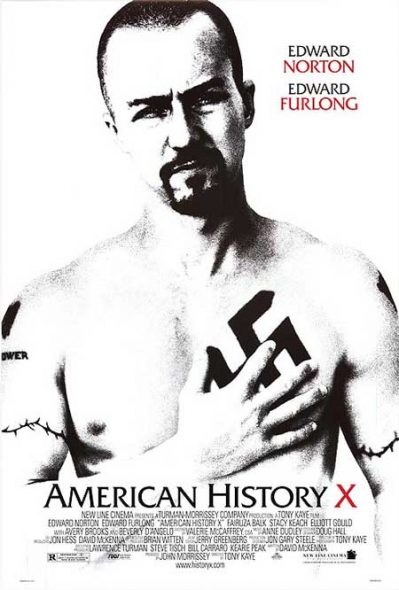
So American History X advances to the championships, probably in slow motion while a full orchestra blares away. But what will it face? Next time, we pit An American Tail (family) vs. American Gangster (capitalism).
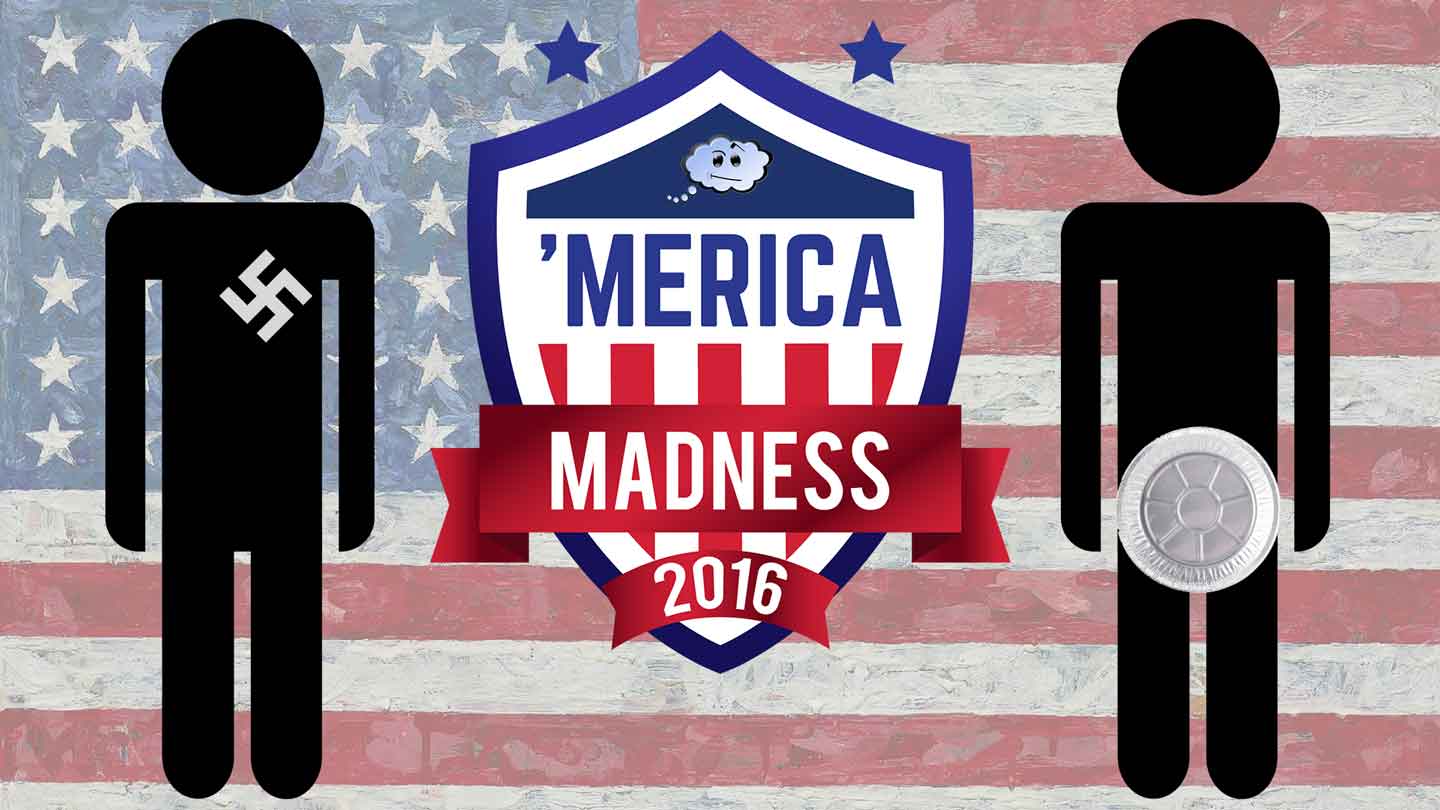
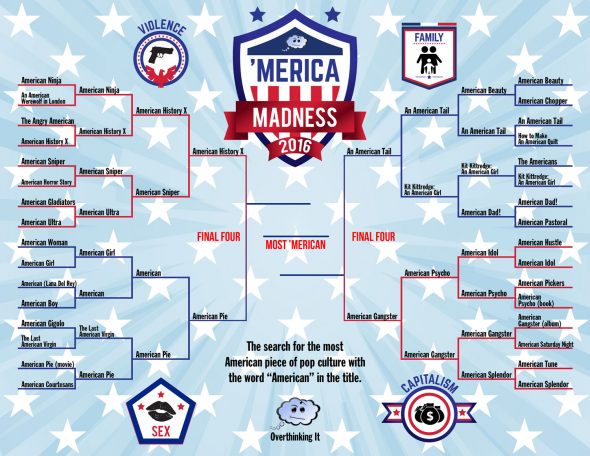
Seconded on Can’t Hardly Wait being the superior film to American Pie. AP -WISHES- it was as cool as CHW.